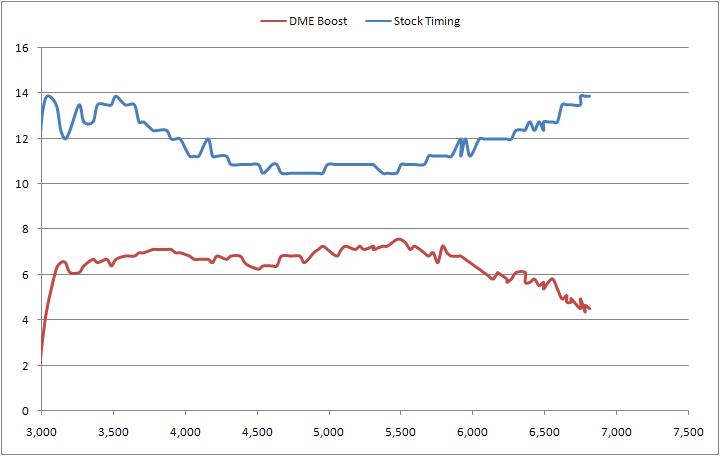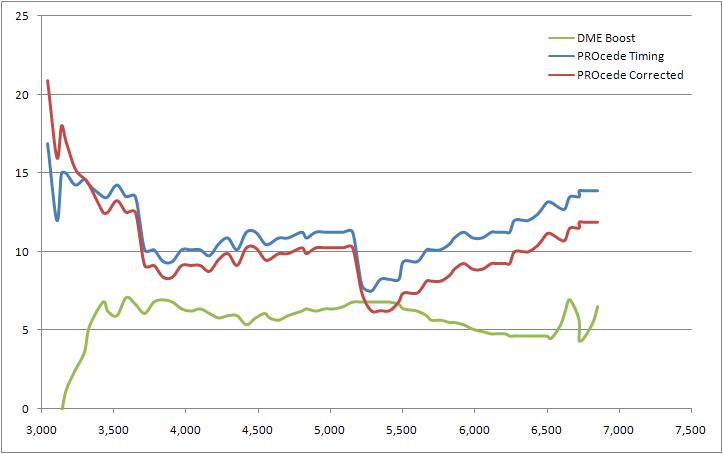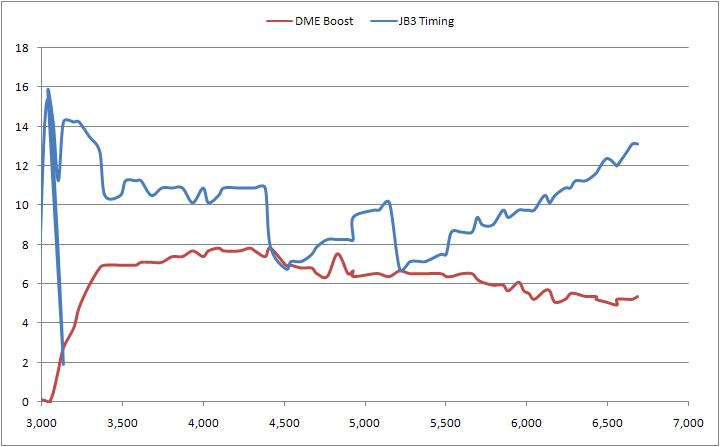

|
|
 |
 |
 |
|
 |
BMW Garage | BMW Meets | Register | Today's Posts | Search |
 |

|
BMW 3-Series (E90 E92) Forum
>
Ignition Timing and Knock Events
|
 |
| 08-31-2009, 08:06 PM | #1 |
|
Major General
  153
Rep 5,780
Posts |
Ignition Timing and Knock Events
There have been some questions on how to determine if one is knocking and the only way to know for sure is to log the actual ignition timing. Currently there are two ways to get the data as required; the BT tool or PROcede Rev II. OBDII interfaces can get ignition timing but is often too slow, not enough data points collected, to provide valuable data. You need at least 10 points per second to be able to see a real curve and events.
The idea is to log the Ignition Timing and RPM at a minimum. Other values can be logged but are not representative of knock occurrences. If knock occurs, only timing is adjusted by the DME, boost is not. It is only after significant knock, to where the DME has reached its limit on pulling timing, that boost will be affected by way of a code and limp occurrence. Knock has multiple causes which all have a relation. In our case, too much boost/compression for a given A/F ratio and ignition timing are the most typical causes. Lower IAT will lessen the issue but eventually too much boost and not enough fuel will eventually run into knock. For an example of a typical curve, see below. As a preface, there is a mechanical reason why an ignition curve looks the way it does. During cruise and light load, the engine will be running significant advance. On the onset of high load/large throttle openings, the ECU will pull timing. But as engine speed increases, timing will be added back in order to keep the actual firing and burning events the same. As the engine speeds up, the time to fire and burn decrease so that more advance is needed. Stock Curve, blue line:  Notice the nice bowl shaped curve and the continual upward climbing of advance as engine speed increases. This is normal and what is expected. Now for comparison, here is a new log which shows a sudden drop at 5200 RPM. The ignition timing dropped approximately four degrees at about 5200 RPM. This was due to a knock event and the DME responding accordingly.  Here is another example but with two events recorded at 4500 and 5200 RPM.  In both it appears obvious that timing was pulled as a reaction to something and that something would be knock. One of the reasons for this thread was a discussion on whether or not knock events occurred in a recent H20/Meth kit thread. Let me add that this is not meant to take away anything from that excellent write up and the OP of that thread deserves commending for talking the time to install, write up and share with everyone. But in looking at the logs, I saw something striking; knock events when stated there was none. I disagreed; hopefully respectfully.  Please keep in mind the Y scales are not the same so the events are no as prevelant. At 2300 RPM there was 5 degrees pulled, at 3200 RPM there was about 3 degrees pulled and at 5700 RPM there was another event which about 3 degrees was pulled. Does this mean the kit was not doing its job, absolutely not. If anything, it was doing a great job. Seeing as though this was Map 9 which is a race gas map only and the seeming severity was minimal, only about 3 degrees pulled at times, it did what it was supposed to. But hopefully this thread provides some insight as to how to read the timing logs. And as always, discussions are welcome but please keep it respectful is you do not agree with others. |
| 08-31-2009, 08:15 PM | #2 |
|
Brigadier General
 102
Rep 3,460
Posts |
I disagree with knock at 2300 rpms. Looks like ignition was retarted to spool the turbos. Many turbo cars do this. The other two events I agree with.
Now that I look at it more, that also might be the point where the OP has the meth to "kick on". He might be using to big of a nozzle. There are many members who think bigger is better, which is not the case. Too much meth/alky will actually cause the engine to knock. If its not a progressive set it up, it might be too much spray downlow. |
|
Appreciate
0
|
| 08-31-2009, 08:35 PM | #3 | |
|
Major General
  153
Rep 5,780
Posts |
Quote:
What I do like is that it finished at nearly 12 degree advance, which is decent on this engine while running a race gas map. That was similar to the Map 6 test I did in the above chart while on 93 octane. |
|
|
Appreciate
0
|
| 08-31-2009, 10:30 PM | #4 |
|
First Lieutenant
  
62
Rep 380
Posts |
Isn't the timing drop at ~4500 rpm pretty standard on tuned cars? If so, is it due to knock events, vanos timing changes, or something else?
The logs I've posted before all consistently drop at ~4500 rpm and the timing curves for 5 runs were right on top of each other from 4500 rpm to redline. |
|
Appreciate
0
|
| 09-01-2009, 05:37 AM | #5 | |
|
Major General
  307
Rep 5,175
Posts |
Quote:
For those that do care, there are different interpretations on what is knock and what is not. Second, all knock is not the same and it can be insignificant to severe, hence the reason the superknock code wasn't triggered nor was a knock flag indicated. Please do not take this post as gospel. In the very next run (after the log posted by Scalbert), the following log was recorded and is smooth as butter:  The second timing drop in the first graph appears to me and many trusted tuners as nothing other than the DME adapting. In fact, I did the same log on a stock car after a reset of the adaption values and guess what it looked like? Exactly the same. I hope the forum understands this is the way the car adapts. If indeed the small timing drops were dangerous, then why are similar insignificant timing drops noted when the car adapts stock? Clearly in the second log I just posted (conviently not posted), you see a rock solid timing curve. I will not participate in this thread anymore, nor will I continue discussions that are full of smoke and deception. My hope is only that the community realizes that what Scalbert says is not shared by all professionals in this or other communities. Last edited by Former_Boosted_IS; 09-01-2009 at 07:26 AM.. |
|
|
Appreciate
0
|
| 09-01-2009, 07:26 AM | #6 |
|
Captain
    
49
Rep 966
Posts |
I have 3 questions about this (forgetting the event @2300 RPM) Not to discredit the meth write up (which was a great DIY BTW) but because I used the assumption that these were knock events when fine tuning my Procede and I want to understand better what I'm looking at.
1) If this is adaptation by the ECU, would you expect to see these events again after driving the car for a few days under normal driving conditions? In other words, isn't the adaptation continuous and the car would therefore adapt to not being at ~16psi and not having meth after a few days of normal driving (no WOT) and then have to re-adapt when you floor the pedal on the right? If so it would imply that these events are an expected occurence every time you change driving behavior. 2) If this is adaptation via "riding the knock sensor", is that a bad thing? Does this only occur after knock happens, or does the ECU have the ability to pull timing based on the likelihood that a knock event is imminent and therefore have no adverse effect on the engine? 3) If this is not knock, what would knock look like with the parameters that were logged? |
|
Appreciate
0
|
| 09-01-2009, 07:38 AM | #7 | |
|
Major General
  307
Rep 5,175
Posts |
Quote:
|
|
|
Appreciate
0
|
| 09-01-2009, 07:54 AM | #8 | |
|
Major General
  153
Rep 5,780
Posts |
Quote:
Nevertheless, the logs I posted clearly show knock events outside of the 4500 RPM range. |
|
|
Appreciate
0
|
| 09-01-2009, 07:58 AM | #9 | |
|
Major General
  153
Rep 5,780
Posts |
Quote:
1) Yes, you would. Just like reseting knock adaptation or running a lower boost maps and switching. The question is if the DME is reacting quick enough so as not to worry about it. We cannot say 100% either way at this point in time. 2) Refer to 1. 3) The high load instances are a reaction to knock regardless what some want to beleive. |
|
|
Appreciate
0
|
| 09-01-2009, 08:07 AM | #10 | |
|
Major General
  153
Rep 5,780
Posts |
Quote:
An attempt to spool the turbos by retarding timing? Granted, yes, the EGT's will go up but there are better ways to get the turbo's moving. But discounting the roll on event (even though timing dropped and started climbing again so the turbos were already up to speed), there were other events recorded. And I agree, the new log looks better albeit the time resolution is low. But the original one I posted from your thread showed events up higher. You say it is adaptation, but to what? Since this is ignition timing we are dealing with that adaptation would be to knock events even if they are minor. |
|
|
Appreciate
0
|
| 09-01-2009, 08:12 AM | #11 | |
|
Major General
  307
Rep 5,175
Posts |
Quote:
|
|
|
Appreciate
0
|
| 09-01-2009, 08:16 AM | #12 | |
|
Major General
  153
Rep 5,780
Posts |
Quote:
This DME does an excellent job of reacting to knock and adding back in timing quickly. But it does occur which was merely my point. Although I have a very difficult time getting it to occur on a stock tune. But I do run 93 octane only... |
|
|
Appreciate
0
|
| 09-01-2009, 08:26 AM | #14 |
|
Major General
  153
Rep 5,780
Posts |
|
|
Appreciate
0
|
| 09-01-2009, 10:07 AM | #15 |
|
Banned
0
Rep 28
Posts |
|
|
Appreciate
0
|
| 09-01-2009, 11:12 AM | #17 | |
|
First Lieutenant
  
62
Rep 380
Posts |
Quote:
|
|
|
Appreciate
0
|
| 09-01-2009, 11:14 AM | #18 |
|
Team Zissou

3065
Rep 10,197
Posts |
|
|
Appreciate
0
|
| 09-01-2009, 12:21 PM | #19 | |
|
Captain
    
49
Rep 966
Posts |
Quote:
 a) Is the only way to know 100% if these events have a tangible negative impact on the engine to look at the internals after this has been occuring for a some period of time? b) Assuming that they do have negative impact (me being risk averse) Are there other variables that we can log that might shed some additional light (engine load, boost target, boost, etc)? c) Are there degrees of severity of these events that can be ascertained based on readings of these variables? For example, can we classify by [Severe, High, Medium, Low] where [x] number of these events with timing pulled more than [y] degrees are seen over [a] consecutive runs with greater than [b] % load on the engine? What would the accepted variables and values be for a N54 engine? Seems like c) probably has a subjective answer(s), and not sure it could happen, but I think it would be nice to have some kind of consensus and standard way to measure this based on data. Would be the safety complement to the FATS performance measurement. |
|
|
Appreciate
0
|
| 09-01-2009, 12:32 PM | #20 | |
|
Major General
  153
Rep 5,780
Posts |
Quote:
B) Ignition timing is the most telling in seeing how the DME is responding to ignition events. C) There is no distinct value we can read that shows the intensity. We can somewhat derive it by looking at how much timing is pulled when an event occurs. If I were to guess, 2 - 3 degrees is minor, 5 - 6 degrees would be moderate knock. Anymore and you will throw a code. This "Super Knock" code is due to hitting the limits on how much timing the DME will pull. At that point it will limp. Another method would be to look at discrete points in the RPM band and see what the overall timing is on different pulls. |
|
|
Appreciate
0
|
| 09-01-2009, 12:40 PM | #21 |
|
Captain
    
49
Rep 966
Posts |
Thanks again. I've got a bunch of data from when I was setting the user adjustables on the Procede a couple weeks back. I'll go back and see if I notice any trends on where the events were occuring and how big the drops were.
|
|
Appreciate
0
|
 |
| Bookmarks |
|
|